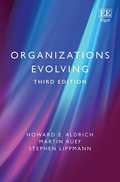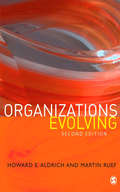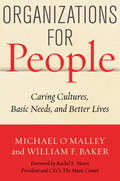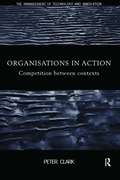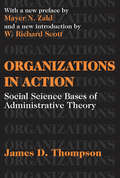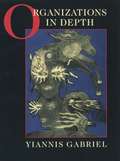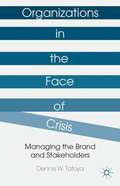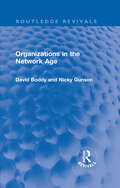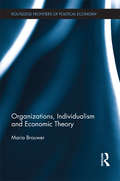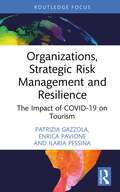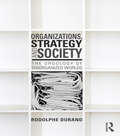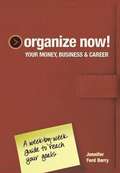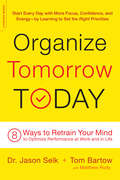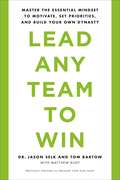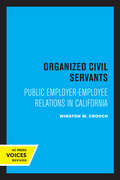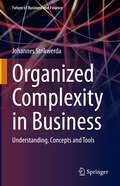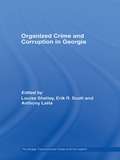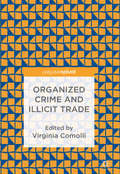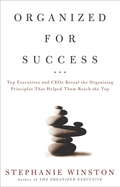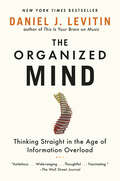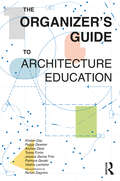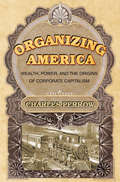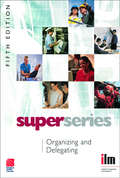- Table View
- List View
Organizations Evolving
by Howard E. Aldrich Martin Ruef Stephen LippmannOrganizations Evolving offers a unique theoretical framework for understanding organizational emergence, persistence, change, and decline. Synthesizing and integrating six paradigmatic approaches to organization theory, this updated and revised third edition presents an evolutionary view that provides a unified understanding of modern organizations and organization theory. Key features of the third edition include: • A sophisticated analytic comparison of six major approaches to understanding modern organizations and their evolution • An interdisciplinary focus, drawing extensively from sociology, social psychology, economics, history, management, and entrepreneurship research • Supplementary materials from academic journals and the popular press, and multi-media resources in an online companion • Extensive case examples that illustrate key evolutionary processes • Study questions designed for extended and reflective learning. Offering key insights and critical learning opportunities, this book is crucial reading for classes covering macro-organizational behavior and the sociology of organizations. Students of management studies and entrepreneurship, particularly those with a focus on organization theory, will also benefit from its interdisciplinary approach.
Organizations Evolving
by Martin Ruef Howard AldrichA keenly anticipated Second Edition of an award winning classic, Organizations Evolving presents a sophisticated evolutionary view of key organizational paradigms that will give readers a unified understanding of modern organizations. <p><p> This Second Edition is an up-to-date survey of the literature, as well as an overview of the new developments across organization studies. It contains new sections on organizational forms, community evolution and methods for studying organizations at multiple levels. <p> The field of organization studies contains many contending paradigms that often puzzle and perplex students. This book is a stunning synthesis of the major organizational paradigms under the umbrella of organizational theory. Scholars and students will find it an excellent guide to the strengths and weaknesses of the various approaches, as well as an outstanding review of the best recent empirical research on organizations. <p> The book includes many helpful features, such as: <p> - Review questions and exercises that will consolidate reader's learning <p> - A methodological appendix that assesses common research methods <p> - Engaging cases that bring principles and concepts to life <p> This Second Edition is a rich resource for study, discussion and debate amongst organizational scholars and postgraduate students of organizations.
Organizations for People: Caring Cultures, Basic Needs, and Better Lives
by Michael O'Malley William F. BakerFor many years, there has been quite a bit of talk about employee engagement as a means to lift corporate profits and reduce absenteeism and turnover. However, this talk has not produced better companies. In fact, the evidence shows that incivility and instances of employee abuse are getting worse. Additionally, with profit as the primary goal of organizations, most employees view any benign treatment they receive as a secondary convenience that will dissipate once corporate fortunes decline. That is, many employees still believe they are expendable in the eyes of their employers. This book turns that equation around by examining the practices of twenty-one companies that put the interests and needs of employees first. Profits are necessary but insufficient for corporate health. The companies featured in this book see it as their mission to offer people a better, more fulfilling life for themselves, and assist with that holistic journey by providing the organizational elements people need to reach their potential. They do this first by creating respectful and kind cultures that treat every person as an equal, sentient partner in the success of the company. Second, they diligently work to satisfy people's basic needs: financial security, belonging, meaning, autonomy, self-acceptance, self-confidence, and growth. The result is a web of fellow-feeling: earnest affection among people who feverishly work to live up to both the high standards of the institution and their obligations to one another. By providing a place where people can do their best work and thrive as individuals and as members of a cohesive community, everyone profits.
Organizations in Action: Competition between Contexts
by Peter ClarkThis original and ambitious work provides a fascinating examination of organizations from both a post-modern and new organizational economics perspective. Combining strategy, international business and organisational theory, it represents a ground-breaking critique of prevailing mainstream modernist theories of organization. Distinctive features include: * a comprehensive analysis of social and organizational theory* discussion and exploration of knowledge capitalism * a critique of core competencies and resource based approaches to strategy, human resource management and organizational behaviour. In an essential area of study for every business undergraduate and reflective manager, this outstanding book pulls together material which is currently scattered and poorly synthesised, and examines high-profile real-world business examples.
Organizations in Action: Social Science Bases of Administrative Theory (Classics In Organization And Management Ser.)
by James D. ThompsonOrganizations act, but what determines how and when they will act? There is precedent for believing that the organization is but an extension of one or a few people, but this is a deceptively simplified approach and, in reality, makes any generalization in organizational theory enormously difficult. Modern-day organizations manufacturing firms, hospitals, schools, armies, community agencies are extremely complex in nature, and several strategies, employing a variety of disciplines, are needed to gain a proper understanding of them.Organizations in Action is a classic multidisciplinary study of the behavior of complex organizations as entities. Previous books on the subject focused on the behavior of people in organizational contexts, but this volume considers individual behavior only to the extent that it helps explain the nature of organizations. James D. Thompson offers ninety-five distinct propositions about the behavior of organizations, all relevant regardless of the culture in which they are found. Thompson classifies organizations according to their technologies and environments. That organizations must meet and handle uncertainty is central to his thesis.Organizations in Action is firmly grounded in concepts and theories in the social and behavioral sciences. While it does not offer an actual theory of administration, the book successfully extends the scientific base upon which any emerging administrative theory must rest. This classic work is of continuing value to organizational and management specialists, behavioral scientists, sociologists, administrators, and policymakers.
Organizations in Depth: The Psychoanalysis of Organizations
by Professor Yiannis Gabriel`The book is a good read. Gabriel has an engaging writing style, liberally interspersed with vignettes, cases, and quotes…. While the reader may not agree with some of what Gabriel is espousing, the author presents his material in a non-judgemental manner…. And who knows ? Maybe Gabriel is foreshadowing some new directions in organizational theory and even new research methodology' - Journal of Occupational and Organizational Psychology This book is a comprehensive and systematic examination of the insights psychoanalysis can offer to the study of organizations and organizational behaviour. Richly illustrated with examples, Yiannis Gabriel's exhaustive study provides fresh understandings of the role of creativity, control mechanisms, leadership, culture, and emotions in organizations. Core theories are explained at length and there is a chapter on research strategies. Extensive reference is made to practical cases, and there is a review of the key debates.
Organizations in the Face of Crisis
by Dennis W. TafoyaAn organization's brand is its most distinctive feature - it is a mechanism for coordinating resources around its vision or mission. Organizations in the Face of Crisis offers a new and unique approach to the treatment of threats to an organization and its brand. In this volume, key concepts associated with crisis events are presented and analysed. Examination of ' brand trauma, ' the potentially debilitating effects of a crisis on an organization, reveals the pervasive nature of a crisis' effects and offers why these effects can haunt a brand and its stakeholders long after the crisis has passed. Tafoya also illustrates ways an organization's core network can be shaken by the emergence of a new network brought on by a crisis. This network, a 'stakeholder swarm', functions to meet its own needs often by challenging the make-up, control and flow of information, and even threatening the effected organization's very existence. Case studies and diagnostic tools are used to demonstrate the effects of a crisis on an organization and its brand, and to provide insight and strategies on managing the crisis at hand as well as the long-term effects that may be linked to the crisis and its occurrence. This volume will appeal to stakeholders on all sides of a crisis: from an organization's managers, employees, customers or clients and to diverse fields of study including law, medicine, religion, military, law enforcement and regulation.
Organizations in the Network Age (Routledge Revivals)
by David Boddy Nicky GunsonThe follow-up to the acclaimed Organizations in the Computer Age this book, originally published in 1996, reveals that since computers had become increasingly linked in networks which span the world, information could be transmitted instantaneously to all parts of the organization. It describes the experiences of six organizations and draws lessons which apply very widely. The issues raised include: the impact on employment levels and organizational structure; the effects of network technology and organization structure and control; the extent of management choice; the role of change agents. This book shows that the introduction of computer networks raises new challenges concerning how the process of change is managed. The lessons from these cases could be widely applied in other organizations undertaking similar large-scale investments in new technology at the time.
Organizations, Individualism and Economic Theory (Routledge Frontiers Of Political Economy Ser. #160)
by Maria BrouwerMost economic theory is based on the assumption that economies grow in a linear fashion. Recessions, depressions and (financial) crises are explained by policy mistakes. However, economic development has historically been uneven, and this state of affairs continues today. This book argues that twentieth century economic theory has marginalized individualism and organizational variety, and puts forward the case for a pluralist approach. This book represents a unique synthesis of business theory and economic theory, which pinpoints the problems with many current mainstream theories and sets out new agendas for research. Here, Maria Brouwer argues that market competition is not about adapting to changes from outside, but is driven by human motivation and goal directed behavior. This gives managerial skills, which do not traditionally have a significant place in mainstream economic theory, a key role. It also highlights the need for organizations that have a motivational culture and appreciate human capital. This differs from the traditional view of the firm as a production function dictated by technology. Brower argues that organizations should be depicted as voluntary associations of people that pursue goals of their own, while firms compete on markets, where relative performance determines their fate. This argument builds on older theories of innovation and market competition that live on in business school curricula, and paints a picture of an economy directed by individuals and firms. This signals a bold departure from standard economic thinking.
Organizations, Strategic Risk Management and Resilience: The Impact of COVID-19 on Tourism (Routledge Focus on Business and Management)
by Patrizia Gazzola Enrica Pavione Ilaria PessinaOrganizations, Strategic Risk Management and Resilience: The Impact of COVID-19 on Tourism aims to identify, analyse and underline the importance of having a conceptual framework designed to develop and improve the risk management and resilience for organizations, particularly during times of crisis. In the aftermath of COVID-19, it is of paramount importance to predict the trajectory of change in consumer behaviour to help managers identify the basis of a resilience strategy to ideally respond to the current situation. In particular, the book focuses on the analysis and description of the Italian tourism sector, giving a report on how the tourism sector reacted to COVID-19, underlining the importance to adopt a resilient approach relevant for evaluating the effective impact of the pandemic dynamics and to provide support tools for decision-makers to be prepared for the unexpected and to be able to follow a smart adaptation. The book shows the latest state of knowledge on the topic and will be of interest to students at an advanced level, academics and reflective practitioners in the fields of strategic and risk management and the business of tourism.
Organizations, Strategy and Society: The Orgology of Disorganized Worlds
by Rodolphe DurandOrganizations are ubiquitous, from clubs and associations to firms and public agencies. They confer meaning to all of us, and our attachment to and membership of organizations have a profound effect on all areas of our lives. However, in our increasingly turbulent world, these organizations run the risk of disappearing or losing their legitimacy, creating a sense of pointlessness and absurdity. Organizations, Strategy and Society: The Orgology of Disorganized Worlds draws on neo-institutional and strategy theories of competitive advantage and develops an integrative approach to theorizing organizations and their behaviors, termed ‘orgology’. It explains that organizations can act strategically to protect and renew the meaning that individuals give to their lives. In so doing, organizations that survive and thrive impose their logics on society, thereby influencing what is legitimate or not. In turn, individuals must reinterpret their multiple associations with organizations and contribute to reinforcing or inhibiting social evolutions. This new way of understanding organizations’ relationships with society results in a reconsideration of management and the role of individuals in building their future. This book will be of interest to students at all levels, to researchers in organizational studies, strategic management and sociology, as well as to people willing to reorganize their world.
Organize Now! Your Money, Business & Career
by Jennifer Ford BerryGet Organized and Get Ahead LET ORGANIZING EXPERTJennifer Ford Berry, author of the best-selling bookOrganize Now! A Week-by-Week Guide to Simplify Your Space and Your Life, show you how to get ahead in your career and personal finances by getting organized. INSIDE YOU'LL FIND: Easy-to-follow checklists that give you results in just one week Time-management tips to increase your productivity at work and at home Strategies for efficiently using social media and mobile devices Ways to organize your resume, job search, and career goals Effective organizing ideas for work spaces Techniques for organizing financial goals and records Expert tips from financial advisors, CPAs and human resources specialists Learn how to create a step-by-step plan that will help you achieve your organizational goals.
Organize Now! Your Money, Business & Career
by Jacqueline Musser Jennifer Ford BerryGet Organized and Get Ahead Let organizing expert Jennifer Ford Berry, author of the best-selling book Organize Now! A Week-by-Week Guide to Simplify Your Space and Your Life, show you how to get ahead in your career and personal finances by getting organized. INSIDE YOU'LL FIND: Easy-to-follow checklists that give you results in just one week Time-management tips to increase your productivity at work and at home Strategies for efficiently using social media and mobile devices Ways to organize your resume, job search, and career goals Effective organizing ideas for work spaces Techniques for organizing financial goals and records Expert tips from financial advisors, CPAs and human resources specialists Learn how to create a step-by-step plan that will help you achieve your organizational goals.
Organize Tomorrow Today: 8 Ways to Retrain Your Mind to Optimize Performance at Work and in Life
by Matthew Rudy Jason Selk Tom BartowDr. Jason Selk helps well-known professional and Olympic athletes as well as Fortune 500 executives and organizations develop the mental toughness necessary to thrive in the face of adversity and achieve elite-level results. Tom Bartow, following a career as a winning college basketball coach, became one of the country's top financial advisors and is now one of the premier business coaches nationwide. Together, Selk and Bartow reveal the secrets of how both elite athletes and business leaders climb to the top.In Organize Tomorrow Today (OTT), two of the top minds in human performance come together to deliver the pathway to extreme success. Doing more is not the answer and Selk and Bartow walk you through how to achieve more by doing less. There is a huge difference between knowing something and understanding. There is an even wider gap between understanding and doing. Highly successful people never get it all finished in any given day; however, they always get the most important things completed. Selk and Bartow offer the 8 fundamentals of doing what is most important. OTT will show you the performance gains that athletes, executives, and salespeople spend tens of thousands of dollars to achieve.
Organize Your Team Today: The Mental Toughness Needed to Lead Highly Successful Teams
by Matthew Rudy Jason Selk Tom BartowFollowing up the popular peak performance book Organize Tomorrow Today, a new plan to motivate, set priorities and lead any team to optimal achievementWatch a triumphant speech after a sports championship or business milestone and you'll almost always hear some variation of this catchphrase: "It couldn't have happened without the great team we have." It doesn't matter if you're the owner of a 10,000-employee Fortune 500 company or running a small business, you're a part of a team. With a combined 50 years of experience building, managing, advising, and troubleshooting teams in both the business and sports worlds, Jason Selk and Tom Bartow now reveal the common DNA that links the highest performing teams.In Organize Your Team Today, Selk and Bartow show how it takes collective mental toughness to win, developed only through a clear understanding of the goals, limitations, roles and personalities on your team. Great leaders respect and embrace channel capacity, Selk and Bartow explain, which means they don't overload their teams with blizzards of tasks and responsibilities. They bust the "focus" and "relationship" fallacies, as those words are meaningless for teams unless they are byproducts of activities that really matter. And Selk and Bartow teach how to manage expectations, since doing so creates a level of respect between the leader and the team--and among the team members--that is a catalyst for peak achievement.
Organized Civil Servants: Public Employer-Employee Relations in California
by Winston W. CrouchIn the early 1960s, the militant demands of some organizations of state and local government employees to participate in decisions about compensation and conditions of employment challenged many established concepts of public administration. A series of strikes revealed a lack of public policy and administrative techniques to cope with the problems presented by aggressive and innovative groups of public employees. Although civil servants had been organized in some communities for as long as fifty years, public attitudes about how such organizations should fit into the political and administrative systems were hazy in the 1960s, and official policies were fragmentary or nonexistent. Some states adopted legislation forbidding public employees to join certain types of organizations. Some highly industrial and urban states enacted legislation creating a system of employer-employee relations based on the theory of collective bargaining developed in industry. California, the most populous state, developed a public policy that differs considerably from the industrial model. In Organized Civil Servants, Winston W. Crouch analyzes factors in California’s political system that have tended to produce this policy. He also analyzes the efforts made to reconcile collective bargaining in the public service with the established concepts and procedures of the merit system of public employment. The ultimate outcome appears to depend on the scope of agreements negotiated between public employers and employee organizations at the bargaining table. This title is part of UC Press’s Voices Revived program, which commemorates University of California Press’s mission to seek out and cultivate the brightest minds and give them voice, reach, and impact. Drawing on a backlist dating to 1893, Voices Revived makes high-quality, peer-reviewed scholarship accessible once again using print-on-demand technology. This title was originally published in 1978.
Organized Complexity in Business: Understanding, Concepts and Tools (Future of Business and Finance)
by Johannes StrikwerdaThis book explores a most central phenomenon in our contemporary businesses and organization, the growing complexity in business. Economic growth and growth of complexity always have been inseparable, but the last decennia the growth of complexity appears to outrun our growth of knowledge and understanding. For success and continuity, the modern firm in the developing complexity of its markets and societal contexts must have the capacity to master and exploit a commensurate level of complexity in its internal organization. This book is the first of its kind to help the reader to understand the different types of complexity and the different concepts and tools to deal with each of them in business administration, strategy, and organization. This book offers the reader a fresh perspective on conventional concepts and tools in the field of business administration and bridges these to new concepts as are being used to exploit new complexities. In the process, the reader becomes familiar with the rich cybernetic concept of information, as a basis for the information-based organization and to master big data. With that complex decision-making is clarified and a fresh understanding of the core function of the organization, coordination, is offered for those who want to solve the issue of self-coordination. The book provides working examples but even more the strongest tool to master and to reduce complexity: a deeper and broader understanding of what is going on beneath the surface of what we experience daily. This book builds on Herbert Simon’s hypothesis of simplicity: ‘to use the simplicity of process to deal with the complexity of state.’
Organized Crime and Corruption in Georgia (Routledge Transnational Crime and Corruption #Vol. 2)
by Louise Shelley Erik R. Scott Anthony LattaGeorgia is one of the most corrupt and crime-ridden nations of the former Soviet Union. In the Soviet period, Georgians played a major role in organized crime groups and the shadow economy operating throughout the Soviet Union, and in the post-Soviet period, Georgia continues to be important source of international crime and corruption. Important changes have been made since the Rose Revolution in Georgia to address the organized crime and pervasive corruption. This book, based on extensive original research, surveys the most enduring aspects of organized crime and corruption in Georgia and the most important reforms since the Rose Revolution. Endemic crime and corruption had a devastating effect on government and everyday life in Georgia, spurring widespread popular discontent that culminated with the Rose Revolution in 2003. Some of the hopes of the Rose Revolution have been realized, though major challenges lie ahead as Georgia confronts deep-seated crime and corruption issues that will remain central to political, economic, and social life in the years to come.
Organized Crime and Illicit Trade: How to Respond to This Strategic Challenge in Old and New Domains
by Virginia ComolliUnlike much of the existing literature on organised crime, this book is less focused on the problem per se as it is on understanding its implications. The latter, especially in fragile and conflict regions, amount to strategic challenges for the state. Whereas most commentators would agree that criminal activities are harmful, this volume addresses the questions of ‘how?’, ‘for whom?’ and, controversially, ‘are they always harmful?’The volume is authored by experts with multi-year experience analysing criminal and other non-state activities. They do so through different lenses - conflict and security, development, and technology - engaging academics, practitioners and policy makers. They offer a comprehensive integrated response to the challenges of transnational organised crime beyond traditional law-enforcement driven recommendations.
Organized Finances, Peaceful Minds: Organization precedes prosperity
by Danilo H. GomesLearn to organize your finances easily and to improve your financial life. We live at a frantic pace. How difficult it is to keep your finances organized! However, despite this fact, if we have the right tools and a day or two available in the month, it is possible to organize the values that come and go. Through this book, learn how to keep your finances in order and, consequently, get rich. ORGANIZED FINANCES, PEACEFUL MINDS aims to bring help for a better financial organization through the use of extremely simple spreadsheets and calculations. Along with the book, gain access to download a complete spreadsheet ideal for financial control. In addition to the spreadsheet and instructions for its use, the book also provides explanations on the types of expenses, ways to analyze the results, financial reserves and basic investment instructions. Increase your earnings through financial organization with excellence. > Learn about: Monitoring of financial transactions, administration of financial spreadsheets, control of expenses, basic notions of investment, financial calculations, among other subjects. > What readers say: "The author taught the ropes. Just be diligent to follow. "Congratulations. I will adapt the spreadsheet to my reality." "Nicely summarized, straight to the point, and downloadable exercises worth applying! I HIGHLY RECOMMEND IT. EXERCISES THAT WORK."
Organized for Success
by Stephanie WinstonIn this groundbreaking guide, Stephanie Winston explains how she discovered, after more than two decades as a leading organization expert and bestselling author, that senior executives and CEOs seem to possess unique conceptual skills in the areas of time management and organization that enable them to dramatically increase their productivity. Intrigued by this revelation, Winston set out to interview dozens of senior executives in an attempt to better understand the work habits and mental discipline of the supersuccessful, and to quantify their skills and translate them into techniques that will enable managers and ambitious workers at all levels of an organization to develop their own productivity and time management style. The result is a concise, practical, inspiring, and information-filled book that will help any reader get organized for success. Among the strategies that Winston uncovered are two that may surprise—and give heart to—many readers. First: top executives deal very differently with the day-to-day interruptions that cause most of us to lose focus and get sidelined. They view them not as a menacing obstruction to workflow but instead as a means to connect with fellow workers and enable more work to be done. Second: supersuccessful businesspeople do not multitask; they focus their complete attention on each task at hand until it is done, and then move on to the next thing. And they employ powerful delegation strategies to enhance their own productivity and that of their team. Among the many other lessons Winston brings to the reader are insights on how to: • conquer e-mail and paperwork gridlock • run and participate in meetings more effectively • develop your own best productivity and time management style • create techniques to find valuable private time in the middle of a hectic day • use follow-up strategies that ensure you respond to others consistently and complete all necessary tasks Throughout Organized for Success, Winston shares practical tips and tested techniques geared to helping workers and managers at every level to adopt the strategies that highly successful executives have employed on their way up the corporate ladder. Even more, she helps us all—not just those who aspire to the senior executive ranks—to adopt an organized and disciplined mind-set in every aspect of our professional lives. From the Hardcover edition.
The Organized Mind: Thinking Straight in the Age of Information Overload
by Daniel J. LevitinNew York Times bestselling author and neuroscientist Daniel J. Levitin shifts his keen insights from your brain on music to your brain in a sea of details.The information age is drowning us with an unprecedented deluge of data. At the same time, we’re expected to make more—and faster—decisions about our lives than ever before. No wonder, then, that the average American reports frequently losing car keys or reading glasses, missing appointments, and feeling worn out by the effort required just to keep up.But somehow some people become quite accomplished at managing information flow. In The Organized Mind, Daniel J. Levitin, PhD, uses the latest brain science to demonstrate how those people excel—and how readers can use their methods to regain a sense of mastery over the way they organize their homes, workplaces, and time.With lively, entertaining chapters on everything from the kitchen junk drawer to health care to executive office workflow, Levitin reveals how new research into the cognitive neuroscience of attention and memory can be applied to the challenges of our daily lives. This Is Your Brain on Music showed how to better play and appreciate music through an understanding of how the brain works. The Organized Mind shows how to navigate the churning flood of information in the twenty-first century with the same neuroscientific perspective.
The Organizer’s Guide to Architecture Education
by Peggy Deamer Kirsten Day Andrea Dietz Tessa Forde Jessica Garcia Fritz Palmyra Geraki Valérie LechêneThe Organizer’s Guide to Architecture Education serves as a timely call-to-action for transforming architecture education to meet the monumental environmental and social challenges of our time.Written by a collective of eight educators, practitioners, and organizers and structured in three parts, the book considers organizing across four scales of architecture education and reorients architecture toward stewarding the planetary commons. It speaks to students, faculty, and administrators in architecture schools, as well as professional architects and built environment practitioners, who recognize the need to expand and decenter the discipline. Readers will gain critical understandings and skills for reimagining architectural pedagogy, practice, and relations to power structures. Empowered by this knowledge, readers will be motivated to contribute actively to and drive systemic change within the field.Illuminated with how-to methods—from power mapping to conversation tactics—and case study precedents, the book catalyzes a collective redefinition of architecture as a vital player in building a socially just and ecologically regenerative future.
Organizing America: Wealth, Power, and the Origins of Corporate Capitalism
by Charles PerrowAmerican society today is shaped not nearly as much by vast open spaces as it is by vast, bureaucratic organizations. Over half the working population toils away at enterprises with 500 or more employees--up from zero percent in 1800. Is this institutional immensity the logical outcome of technological forces in an all-efficient market, as some have argued? In this book, the first organizational history of nineteenth-century America, Yale sociologist Charles Perrow says no. He shows that there was nothing inevitable about the surge in corporate size and power by century's end. Critics railed against the nationalizing of the economy, against corporations' monopoly powers, political subversion, environmental destruction, and "wage slavery." How did a nation committed to individual freedom, family firms, public goods, and decentralized power become transformed in one century? Bountiful resources, a mass market, and the industrial revolution gave entrepreneurs broad scope. In Europe, the state and the church kept private organizations small and required consideration of the public good. In America, the courts and business-steeped legislators removed regulatory constraints over the century, centralizing industry and privatizing the railroads. Despite resistance, the corporate form became the model for the next century. Bureaucratic structure spread to government and the nonprofits. Writing in the tradition of Max Weber, Perrow concludes that the driving force of our history is not technology, politics, or culture, but large, bureaucratic organizations. Perrow, the author of award-winning books on organizations, employs his witty, trenchant, and graceful style here to maximum effect. Colorful vignettes abound: today's headlines echo past battles for unchecked organizational freedom; socially responsible alternatives that were tried are explored along with the historical contingencies that sent us down one road rather than another. No other book takes the role of organizations in America's development as seriously. The resultant insights presage a new historical genre.
Organizing and Delegating (Institute of Learning & Management Super Series)
by Institute of Leadership & ManagementSuper series are a set of workbooks to accompany the flexible learning programme specifically designed and developed by the Institute of Leadership & Management (ILM) to support their Level 3 Certificate in First Line Management. The learning content is also closely aligned to the Level 3 S/NVQ in Management. The series consists of 35 workbooks. Each book will map on to a course unit (35 books/units).
